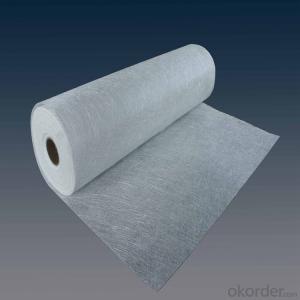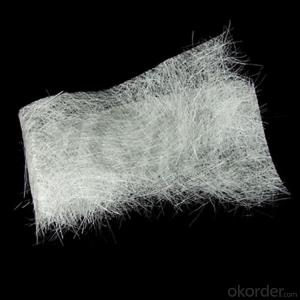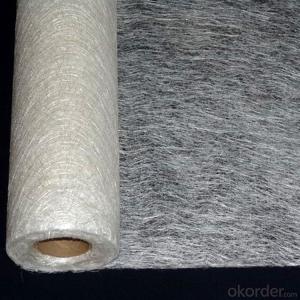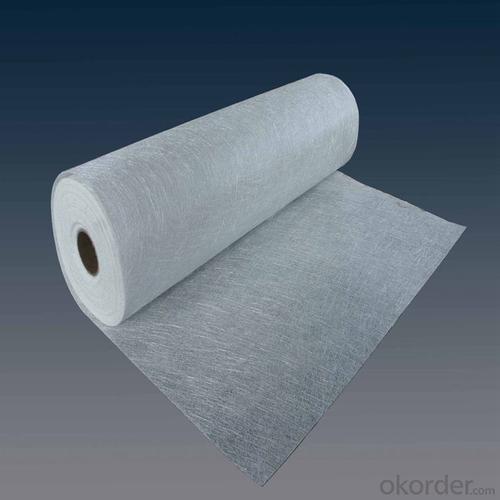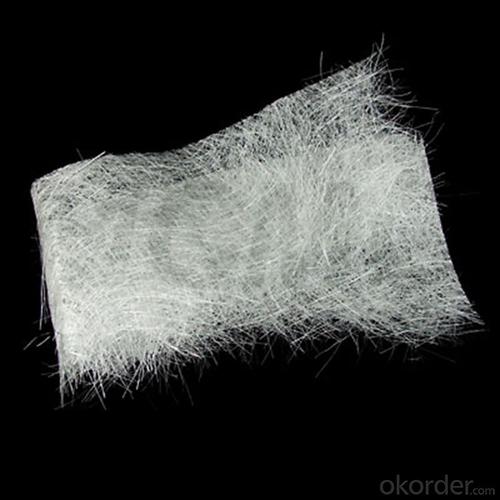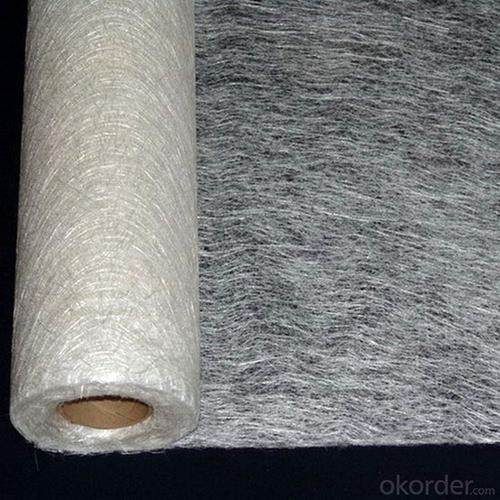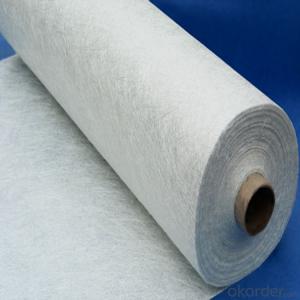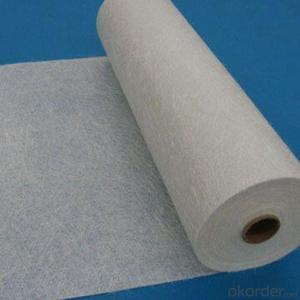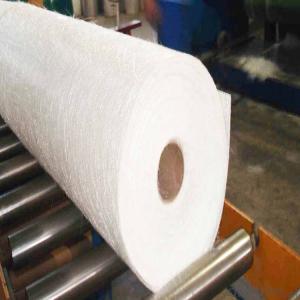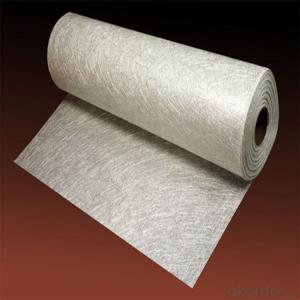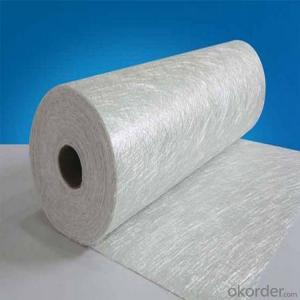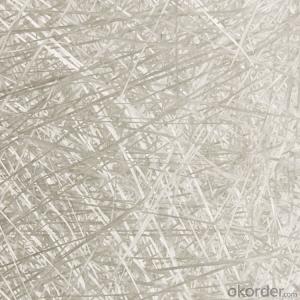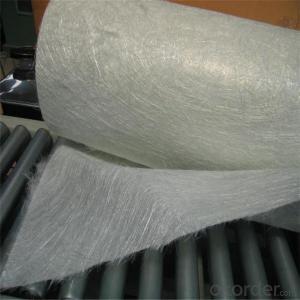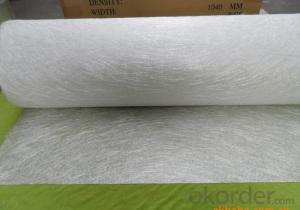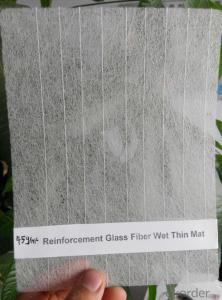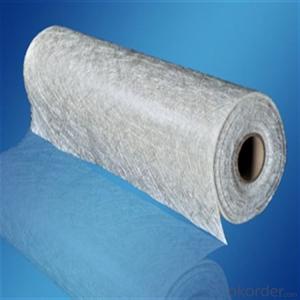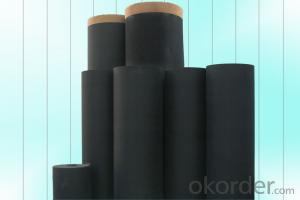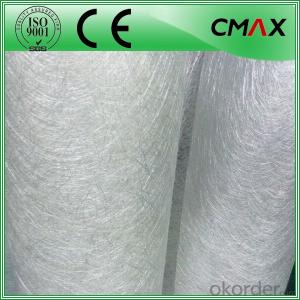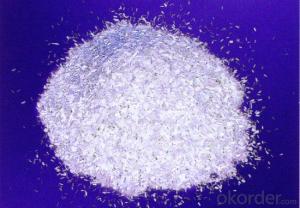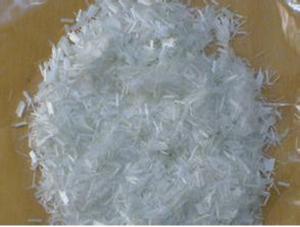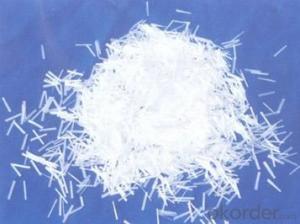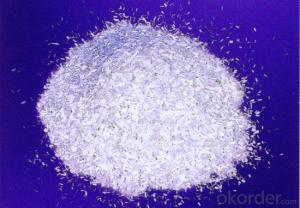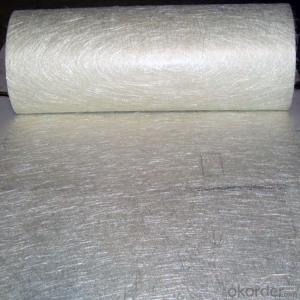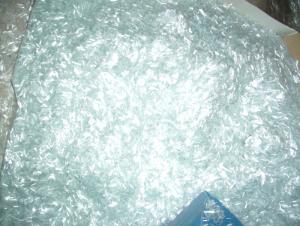Jushi Fiberglass Chopped Strand Mat / CSM Glass Fiber Mat / Fiberglass Mat / Emulsion or Powder Mat
- Loading Port:
- China main port
- Payment Terms:
- TT OR LC
- Min Order Qty:
- 50 kg
- Supply Capability:
- 10000 kg/month
OKorder Service Pledge
OKorder Financial Service
You Might Also Like
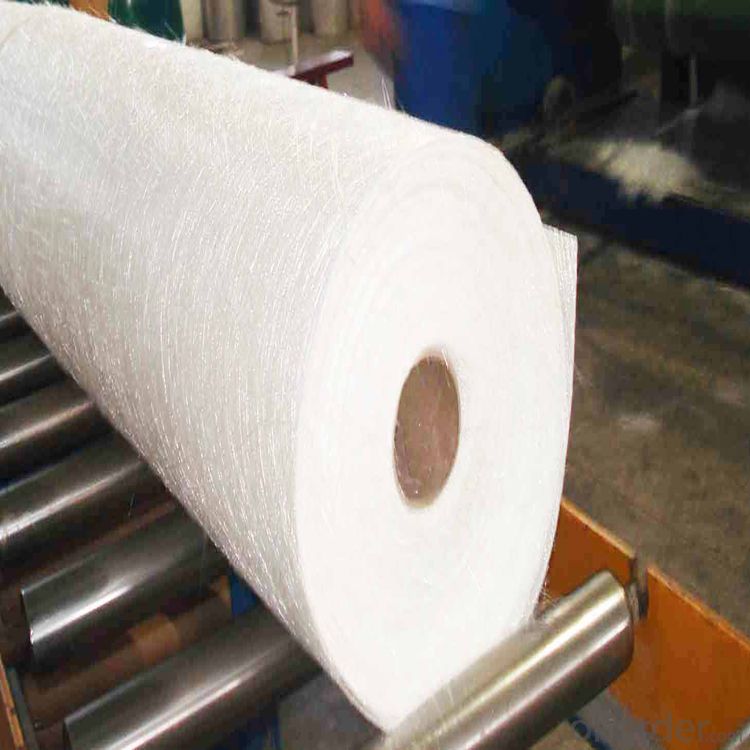
Product Description:
Fiberglass Chopped Strand Mat is fine strand reinforcement material made from E-glass cut fibers laid in a random pattern and bonded with powder or emulsion binder.
It is easy to handle and has excellent moulding performance.
Also, it has rapid resin penetration together with a fast strand wet out time.
The mat also brings a highly translucent finished laminates.
Also,the fine strand input makes the fiber prominence at the finished laminates surface extremely low.
Features
1.Excellent weight uniformity
2.Fast wet out
3.Easy air release
4.Excellent transparency of finished products
5.Excellent laminate
6.Low resin consumption
Application
1.Translucent roof panel
2.chemical storage tanks
3.FRP pipes
4.Boat hulls
5.Decks
6.Truck body panel
7.Cooling towers
8.Corrosion resistand
Specifications:
Item | Over Density | Moisture Content | Chop Density | Polyester Yarn | Width |
(g/m2) | (%) | (g/m2) | (g/m2) | (mm) | |
EMK300 | 309.5 | ≤0.15 | 300 | 9.5 | 50-3300 |
EMK380 | 399 | 380 | 19 | ||
EMK450 | 459.5 | 450 | 9.5 | ||
EMK450 | 469 | 450 | 19 | ||
EMC0020 | 620.9 | 601.9 | 19 | ||
EMC0030 | 909.5 | 900 | 9.5 |
Special products are available according to customer’s requirement.
Product Packaging:
Each Surface Tissue is wound onto a paper tube which has an inside diameter of 76mm and the mat roll has a diameter of 330mm. The mat roll is wrapped up with plastic film,and then packed in a cardboard box or wrapped up with kraft paper. The rolls can be vertically or horizontally placed. For transportation, the rolls can be loaded into a cantainer directly or on pallets.
Quantity
20'GP Container:About 10000kgs
40'HP Container:Aboout 23100kgs
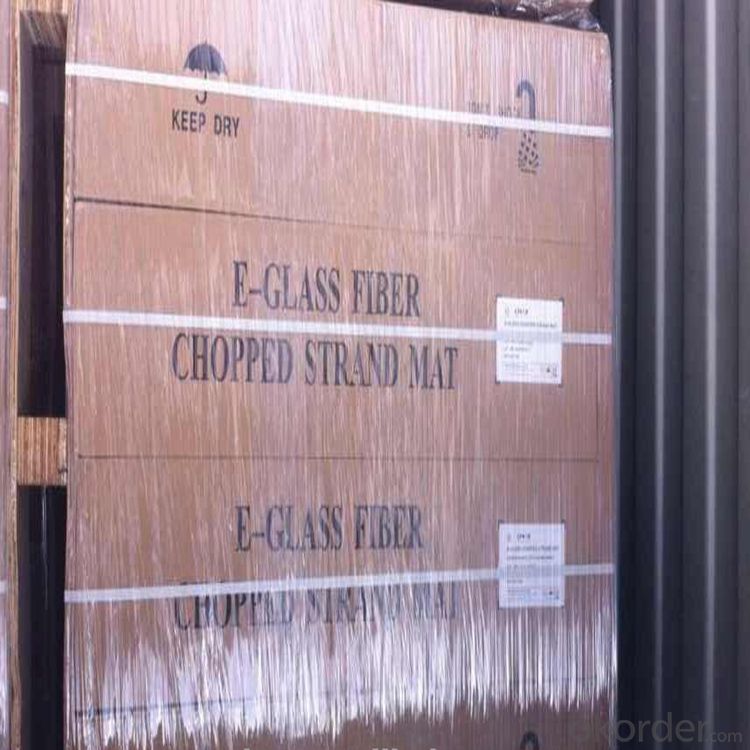
Product Storage:
Unless otherwise specified, Chopped Strand Mat should be stored in a dry, cool and rain-proof area. It is recommended that the room temperature and humidity should be always maintained at 15℃~35℃ and 50%~75% respectively.
Company Information
CNBM (China National Building Material) Group is the largest comprehensive building materials group in China that in integrate scientific research, manufacturing and logistics into one entity. The largest building materials and equipment specialists in China. Upon State Council approval, today CNBM owned more than 300 subordinate manufacturing factories and servicing companies. There are 6 fully owned public listed companies and 11 partially owned with substantial shares public listed companies. In many of these fields, CNBM is playing the leading role in the building industry in the country.
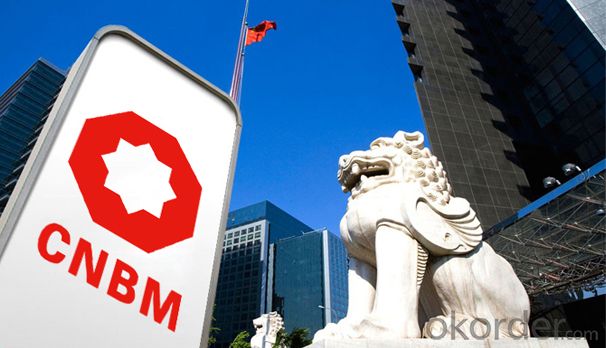
Our Service:
1.Any inquiry will be replied within 24 hours.
2.Professional manufacturer.
1) Print logo in the products;
2) The size and specification can be produce and design according to your demand.
3.High quality,fashion designs,reasonable and competitive price,fast lead time.
4.After-sale service
1) All products will have been strictly quality check in house before packing.
2) All products will be well packed before shipping.
3) All our products have 10 years rot resistance.
5.Faster delivery:sample order in stock,and 15-20 days for bulk production.
6.Payment:you can pay for the order via:T/T,Western Union,MoneyGram,L/C etc.
FAQ:
which kind of glass fiber sample and materials can you provide?
We can provide the glass fiber and glass fiber down stream products samples of E glass, C glass, ECR glass, High alkali glass. The products includes single end roving, assembled roving for different applications( Piping, SMC, panel, winding mill plate) , chop strand for BMC, engineering plastic (PA, PPA, PPT, POM, etc), chop strand mat (from 100gsm-900gsm) for automobile and water tank, etc, woven roving (270gsm-800gsm), surface tissue (25-50gsm), multi-axial fabric of different unit weight.
- Q: Is fiberglass chopped strand compatible with thermoplastic resins?
- Indeed, thermoplastic resins are compatible with fiberglass chopped strand. It is commonplace to employ fiberglass chopped strand as a reinforcing substance in thermoplastic composites. Typically, the chopped strands are blended with thermoplastic resins, such as polypropylene (PP) or polyethylene (PE), and subsequently subjected to manufacturing techniques like injection molding or extrusion. Through processing, the thermoplastic resin undergoes melting, ensuring the even dispersion of the chopped strands within the material. The amalgamation of fiberglass chopped strand and thermoplastic resin culminates in a robust and enduring composite material that enjoys widespread application across various industries.
- Q: What is the cost of fiberglass chopped strand?
- The cost of fiberglass chopped strand can vary depending on factors such as the quantity needed, quality of the material, and the supplier. Generally, the price can range from around $1 to $3 per pound.
- Q: How does the processing temperature of fiberglass chopped strand affect its performance?
- The overall performance of fiberglass chopped strand is significantly affected by its processing temperature. Typically, fiberglass chopped strand is subjected to high temperatures, usually around 250-300 degrees Celsius (482-572 degrees Fahrenheit), during the manufacturing process. The physical and mechanical properties of the fiberglass chopped strand are influenced by the processing temperature. When exposed to higher temperatures, the glass fibers become more pliable and can be easily shaped and molded into different forms. This versatility allows the fiberglass chopped strand to be utilized in a wide array of applications, ranging from automotive components to construction materials. Moreover, the adhesion and bonding properties of the fiberglass chopped strand are also impacted by the processing temperature. Increased temperatures enable the resin, which is responsible for binding the glass fibers, to fully penetrate and envelop the fibers. As a result, the composite becomes stronger and more durable. This enhanced bonding strength is particularly important in applications where the fiberglass chopped strand is exposed to high levels of mechanical stress or environmental factors. Nevertheless, it is crucial to note that excessively high processing temperatures can be detrimental to the performance of the fiberglass chopped strand. If the temperature surpasses the glass transition temperature of the fibers, their structural integrity may be compromised, leading to brittleness. This reduction in strength and stiffness renders the fiberglass chopped strand less suitable for demanding applications. To summarize, the processing temperature of fiberglass chopped strand plays a vital role in determining its performance. It is imperative to properly control and optimize the processing temperature to ensure that the desired physical, mechanical, and bonding properties of the fiberglass chopped strand are attained for specific applications.
- Q: What are the different certifications and standards applicable to fiberglass chopped strand?
- Fiberglass chopped strand is subject to numerous certifications and standards, all of which guarantee the product's quality and safety. Among the most prevalent certifications and standards are: 1. ISO 9001: This certification establishes a quality management system that requires manufacturers to adhere to globally recognized quality standards during the production of fiberglass chopped strand. 2. ASTM D578-13: This American Society for Testing and Materials (ASTM) standard outlines specifications for glass fiber strands used in reinforced plastics. 3. UL 94: Underwriters Laboratories (UL) has established this flammability standard to evaluate the flammability of materials, including fiberglass chopped strand. 4. RoHS: The Restriction of Hazardous Substances (RoHS) directive regulates the use of certain hazardous substances in electrical and electronic equipment, including fiberglass chopped strand. 5. REACH: The Registration, Evaluation, Authorization, and Restriction of Chemicals (REACH) regulation, a European Union standard, ensures the safe utilization of chemicals involved in the production of fiberglass chopped strand. 6. JIS: The Japanese Industrial Standards (JIS) provide specifications for various industrial activities in Japan, including the manufacturing and application of fiberglass chopped strand. 7. OSHA: The Occupational Safety and Health Administration (OSHA) establishes regulations and standards pertaining to workplace safety in the United States, encompassing the handling and usage of fiberglass chopped strand. These certifications and standards offer consumers and end-users reassurance regarding the quality, safety, and environmental aspects of fiberglass chopped strand. Manufacturers and suppliers must comply with these certifications and standards to guarantee customer satisfaction and adherence to regulatory requirements.
- Q: Is fiberglass chopped strand compatible with melamine resin?
- Fiberglass chopped strand can indeed be used with melamine resin, as melamine resin is a thermosetting plastic characterized by its exceptional chemical resistance and durability. It has the remarkable ability to form robust connections with different reinforcing fibers, including fiberglass chopped strand. Once the chopped strand is saturated with melamine resin and subjected to the curing process, it results in a composite material that exhibits improved strength, rigidity, and resistance against chemicals, heat, and moisture. This compatibility renders fiberglass chopped strand a perfect reinforcement material for melamine resin-based composites in diverse sectors like automotive, construction, and aerospace.
- Q: How does the diameter of fiberglass chopped strand affect its performance?
- The diameter of fiberglass chopped strand directly affects its performance. A larger diameter strand typically provides higher strength and stiffness, making it suitable for applications that require high mechanical properties. On the other hand, a smaller diameter strand offers better flexibility and improved resin wetting, making it more suitable for applications that require good conformability and improved surface finish. Therefore, the diameter of fiberglass chopped strand must be carefully chosen to match the specific performance requirements of the intended application.
- Q: Can fiberglass chopped strand be used in the production of electrical insulation materials?
- Yes, fiberglass chopped strand can be used in the production of electrical insulation materials. Fiberglass is known for its excellent electrical insulation properties, making it an ideal choice for applications where electrical insulation is required. The chopped strand form of fiberglass consists of short fibers, which can be mixed with other materials and processed to create various insulation products such as tapes, sheets, and coatings. The chopped strand form allows for better dispersion and distribution of the fibers within the material, enhancing its electrical insulation capabilities. Additionally, fiberglass chopped strand is also resistant to high temperatures, chemicals, and moisture, further contributing to its suitability for electrical insulation applications.
- Q: How does the toughness of the chopped strand affect its performance?
- The toughness of the chopped strand directly affects its performance in several ways. Firstly, a higher toughness indicates a greater resistance to breakage or failure under stress. This means that a chopped strand with higher toughness will be able to withstand more strain or force before it fractures or tears. This is particularly important in applications where the chopped strand is subjected to high levels of mechanical stress or impact, such as in reinforced composites or structural components. Additionally, the toughness of the chopped strand also impacts its ability to maintain its integrity and mechanical properties over time. A higher toughness generally indicates a greater ability to resist degradation or wear, ensuring that the chopped strand remains effective and reliable in its intended application for a longer period. This is crucial in industries where durability and longevity are critical factors, such as automotive, aerospace, or construction. Moreover, the toughness of the chopped strand can also influence its handling and processing characteristics. A higher toughness may make the chopped strand more difficult to cut or manipulate during fabrication, requiring specialized equipment or techniques. On the other hand, a lower toughness may make the chopped strand more prone to breakage or damage during handling, leading to potential quality issues or decreased performance. In summary, the toughness of the chopped strand directly impacts its performance by determining its resistance to breakage, ability to maintain mechanical properties over time, and handling characteristics. Therefore, understanding and optimizing the toughness of the chopped strand is crucial in ensuring its effectiveness and reliability in various applications.
- Q: Can fiberglass chopped strand withstand high temperatures?
- Yes, fiberglass chopped strand can withstand high temperatures. The specific temperature range that fiberglass can handle depends on the type and grade of the material. Generally, fiberglass chopped strand can withstand temperatures up to 1000°F (538°C) without losing its structural integrity. However, it is important to note that prolonged exposure to high temperatures can cause the material to weaken and degrade over time. Therefore, it is advisable to consult the manufacturer's specifications and guidelines to ensure that the fiberglass chopped strand is used within its recommended temperature limits.
- Q: Make 0.3 mm glass fiber short cut. What kind of fiberglass yarn is good?
- The glass is made of glass fiber chopped after melting, with high-speed airflow or flame blow it into thin and short fiber, which became a moisture-proof glass wool. Superfine glass wool, more than 200 together only a hair so rough. Glass cotton has strong thermal insulation properties. 3 cm thick glass wool insulation, its ability to compete is equivalent to 1 meters thick brick! Glass wool sound-absorbing effect is also very good. So it is used as insulation, in many industrial sectors in sound insulation, heat insulation, shockproof and filtration materials.
Send your message to us
Jushi Fiberglass Chopped Strand Mat / CSM Glass Fiber Mat / Fiberglass Mat / Emulsion or Powder Mat
- Loading Port:
- China main port
- Payment Terms:
- TT OR LC
- Min Order Qty:
- 50 kg
- Supply Capability:
- 10000 kg/month
OKorder Service Pledge
OKorder Financial Service
Similar products
Hot products
Hot Searches
Related keywords
